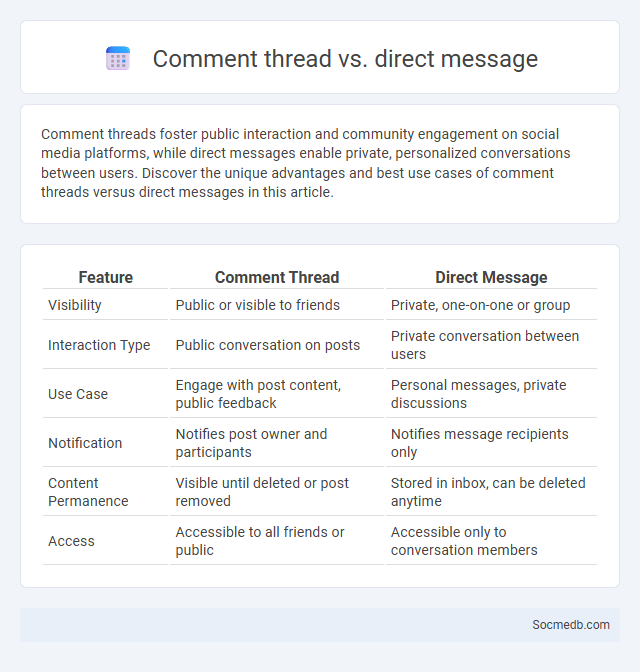
Photo illustration: Comment Thread vs Direct Message
Comment threads foster public interaction and community engagement on social media platforms, while direct messages enable private, personalized conversations between users. Discover the unique advantages and best use cases of comment threads versus direct messages in this article.
Table of Comparison
| Feature | Comment Thread | Direct Message |
|---|---|---|
| Visibility | Public or visible to friends | Private, one-on-one or group |
| Interaction Type | Public conversation on posts | Private conversation between users |
| Use Case | Engage with post content, public feedback | Personal messages, private discussions |
| Notification | Notifies post owner and participants | Notifies message recipients only |
| Content Permanence | Visible until deleted or post removed | Stored in inbox, can be deleted anytime |
| Access | Accessible to all friends or public | Accessible only to conversation members |
Introduction to Online Communication Channels
Online communication channels encompass social media platforms, email, instant messaging, and forums that enable real-time interaction and content sharing across the globe. These channels facilitate diverse forms of engagement, from personal conversations to brand-customer interactions, shaping your digital presence and influence. Understanding how to leverage these tools effectively can enhance communication strategies and foster meaningful connections.
What is a Comment Thread?
A comment thread on social media is a sequence of replies linked to an original post, allowing users to engage in detailed discussions under specific content. It organizes conversations by displaying comments and their direct responses in a nested structure, enhancing user interaction and clarity. This feature helps maintain context and fosters community engagement by enabling interactive dialogue within a focused topic.
What is a Direct Message?
A Direct Message (DM) is a private form of communication on social media platforms like Instagram, Twitter, and Facebook, enabling users to send texts, images, or videos directly to one another without public visibility. This feature facilitates one-on-one conversations, allowing for confidential exchanges and personal interactions beyond public posts or comments. DMs support enhanced privacy and targeted communication, making them essential for customer service, networking, and personal chats within social networks.
Key Differences: Comment Thread vs Direct Message
Comment threads on social media enable public interactions where multiple users can engage in a visible conversation under a post, promoting community dialogue and shared insights. Direct messages provide private, one-on-one communication channels for personalized and confidential conversations between individuals or select groups. The key difference lies in visibility: comment threads are open and collaborative, while direct messages prioritize privacy and exclusivity.
Privacy Concerns: Public vs Private Conversations
Social media platforms often blur the lines between public and private conversations, raising significant privacy concerns for users. Your personal information and messages can be exposed unintentionally through sharing settings, data breaches, or platform policies that prioritize data collection. Ensuring proper privacy controls and understanding each platform's security features are essential to protecting your online interactions.
Use Cases: When to Use Comment Threads
Comment threads are essential when you want to foster detailed discussions or gather diverse opinions on social media posts, allowing users to engage in structured conversations. Your brand benefits from using comment threads during product launches, customer service interactions, or event announcements to manage feedback efficiently and enhance user experience. Monitoring these threads helps identify trends, sentiment, and potential issues, making them crucial for real-time community management and targeted marketing strategies.
Use Cases: When to Use Direct Messages
Direct messages excel for private conversations, customer support, and resolving sensitive issues quickly without public exposure. Brands leverage direct messages to foster personalized engagement, handle order inquiries, or manage complaints efficiently. Influencers and businesses use this channel to build authentic relationships and coordinate collaborations discreetly.
Pros and Cons of Comment Threads
Comment threads on social media enhance user engagement by fostering dynamic discussions and enabling diverse perspectives, which can strengthen community bonds and allow You to gain deeper insights. However, lengthy or heated comment threads may lead to misinformation spread, increased moderation challenges, and decreased overall user experience due to potential negativity or off-topic distractions. Balancing these pros and cons is essential for optimizing interaction quality and ensuring meaningful communication on platforms.
Pros and Cons of Direct Messages
Direct messages on social media offer a private, immediate way to communicate, fostering personal connections and facilitating quick information exchange. However, they can also present challenges such as potential miscommunication, privacy concerns, and the risk of spam or unsolicited messages. Effective use of direct messaging requires balancing convenience with awareness of security and etiquette.
Choosing the Right Channel for Your Communication Needs
Selecting the right social media channel depends on your target audience's preferences, content type, and engagement goals. Platforms like Instagram excel for visual storytelling, LinkedIn suits professional networking, and Twitter is ideal for real-time updates and conversations. Understanding these nuances ensures your communication strategy effectively reaches and resonates with your audience.
 socmedb.com
socmedb.com